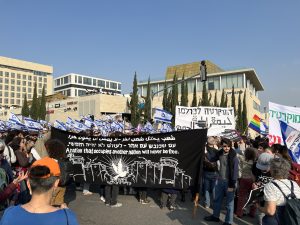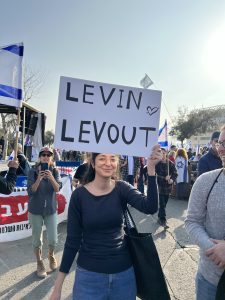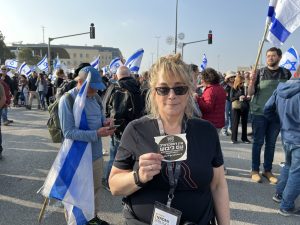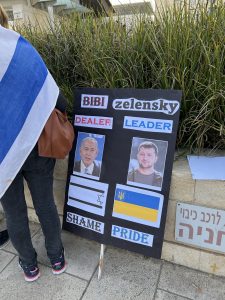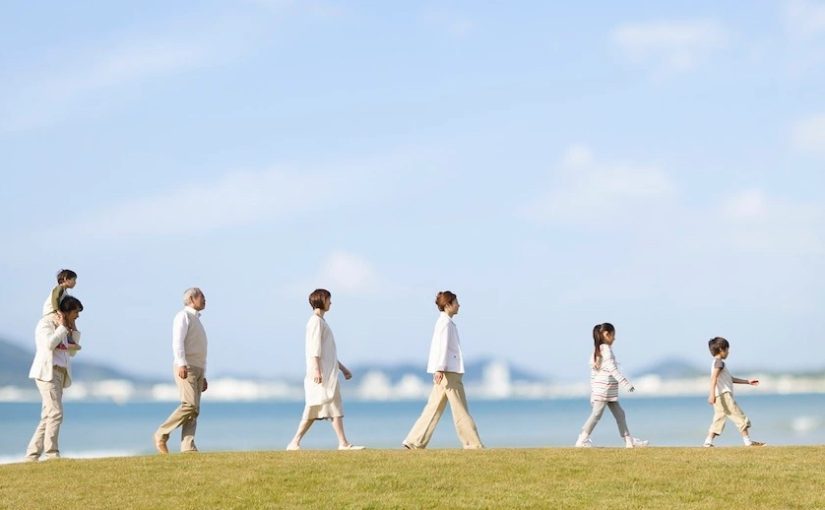At the demonstration before the first reading …
Category: Relationships
In the streets of Jerusalem
Off to Israel
Shabbat Shalom
Shabbat Shalom
This Shabbat, Takshivu invites us to pay attention.
Shabbat Shalom.
Verse 1: 9 years old and a flickering flame Those are the moments I can’t explain Looking back I can feel the heat The warmth reflecting off my cheek
Verse 2: Settled down now its been so long Since I’ve seen them sing those songs Carries me through the days I feel That there’s nothing else that heals
Pre: Been through those ups and downs They called me lost and found But now I think I found myself In that flickering flame Oh, in that flickering flame
Chorus: Ooh oooh My mind fills with memories from youth Ooh oooh Just me and the flame but now I’m flickering too Looking back at Pictures on my shelf Times I felt my safest Times I felt myself Thinking back when There was no where to run I knew I had a purpose My life had just begun Just like the flame
Intro: Ooooh woah ohhh
Verse 3: Grown up now I’m on my way Driven by those flames Everytime I lose my sight I remember those guiding lights
Pre: Been through those ups and downs They called me lost and found But now I think I found myself In that flickering flame Oh, in that flickering flame
Chorus: Ooh oooh My mind fills with memories from youth Ooh oooh Just me and the flame but now I’m flickering too Looking back at Pictures on my shelf Times I felt my safest Times I felt myself Thinking back when There was no where to run I knew I had a purpose My life had just begun
Bridge: Some things things things you just can’t forget Brings us back back back back to ourselves Back to the good good good old days ‘Cause we’re all we’re all flickering flames
Chorus: Ooh oooh My mind fills with memories from youth Ooh oooh Just me and the flame but now I’m flickering too Looking back at Pictures on my shelf Times I felt my safest Times I felt myself Thinking back when There was no where to run I knew I had a purpose My life had just begun Just like the flame
We are of a particular generation, us boomers.
Our cohort is thinning. We watch as icons, friends, and family of our generation die. So many of us have already lost our parents, and our grandparents have been consigned to our memories for years.

PHOTOGRAPH BY SAPPINGTON TODD—GETTY IMAGES/BLOOMIMAGE RF
It is a natural process but a sobering one. Our days may still be many, but the time ahead of us is far shorter than the time we have already lived.
We are of a particular generation, us boomers. We who live on reflect on our mortality and what our lives will mean to those who will continue after we are gone.
A friend of mine used to joke that he read the obituary first thing in the paper, and if he didn’t see his name, he knew it would be a good day. Gallows humor perhaps, but now is the time to ensure the gift that is the remainder of our lives is lived well. What do we have yet to accomplish? Have we been faithful to our ideals, and what amends must we make for the times we did not?
What will we leave behind to those we love? Will they remember us as unique parts of their lives, filled with experiences of beautiful times together? Now is the time to reach out to them and make our time together memorable- it is a gift for us both.
Shabbat Haftarah for Martin Luther King Weekend
This stirring mash-up of speeches by the Reverend Martin Luther King Jr. set to the Haftarah trope (the chanting used for the Prophetic books) reminds us how we are connected.
Shabbat Shalom
In the Midbar
Fess up– Hanukkah is the Jewish Christmas!
Fess up– Hanukkah is the Jewish Christmas!
Before I continue, I will let those of you gasping for air catch your breath.
Yes, indeed, the rabbi went there! But it is hard to refute the statement. And you know what else? It is okay.
Here in the United States, we have thought longingly of the Christmas portrayed ironically by Irving Berlin- replete with a white (from the snow, that is)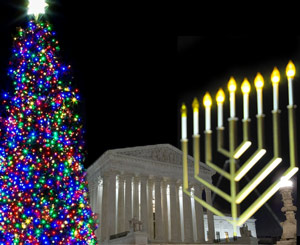 Christmas with cards, sleigh bells, and glistening trees. The Coca-Cola Santa Claus brings presents to everyone traveling on a flying sleigh powered by eight reindeer (nine including Rudolph), Christmas Trees, gifts, love, and good cheer. Of course, once the marketers got hold of this, they commercialized the holiday even further. Everyone who ever sang anything now records an album of Christmas songs or has a television Christmas special.
Christmas with cards, sleigh bells, and glistening trees. The Coca-Cola Santa Claus brings presents to everyone traveling on a flying sleigh powered by eight reindeer (nine including Rudolph), Christmas Trees, gifts, love, and good cheer. Of course, once the marketers got hold of this, they commercialized the holiday even further. Everyone who ever sang anything now records an album of Christmas songs or has a television Christmas special.
Who wouldn’t want to be a part of this party?
So we have amped up Hanukkah, a minor yet complicated holiday, not even part of the Jewish Bible. Our Acceptance in this country is the great miracle of our time. And if we could place the menorah in the window without fear of retribution, what else might we enjoy? The secularized Christmas is at the center of the American holiday season, bounded by Thanksgiving and New Year’s.
So we are in full bloom- we have Hanukkah bushes, lights of blue and white to decorate the house, and latkes and sufganiyot are now things in the American public space! Giant menorahs are lit alongside the Christmas trees, eclipsing the simple manger scenes of the holiday’s religious roots. It is a mash-up of the best our traditions have to offer, and we all join together in the kind of unity we could only pray might somehow extend to all the other days of the year (either 364 if you are Christian or 357 if you are Jewish).
scenes of the holiday’s religious roots. It is a mash-up of the best our traditions have to offer, and we all join together in the kind of unity we could only pray might somehow extend to all the other days of the year (either 364 if you are Christian or 357 if you are Jewish).
They say competition is a good thing. And arguably, Hanukkah is a bigger, better celebration because of Christmas.
Let us wish everyone Happy Holidays and a year of bounty and joy. Let us thank God for bringing us to a time when our lights can burn brightly, and we can be with our brothers and sisters; whatever their faith traditions, we are together here in the United States.
As the candles glow, Remember Them
Now is the time to rededicate ourselves to the cause of humanity by helping Ukrainians during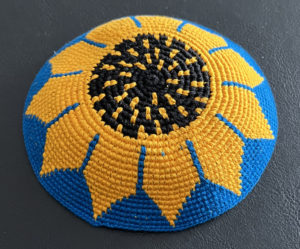 this harsh winter. The Russians are brutal, targeting civilians to bring Ukraine to it’s knees.
this harsh winter. The Russians are brutal, targeting civilians to bring Ukraine to it’s knees.
Please help by donating what you can to the relief efforts.
Donate here and receive a Kippah to proudly display, like the Menorah in the window, that you #StandWithUkraine. www.RabbiDavidLevin.com/Kippah.
Chag Urim Sameach!
Shabbat Shalom (and Chag Urim Sameach)
As we welcome Shabbat, Hanukkah comes immediately after on the 18th. Six13, the outstanding a capella group shares “Elton Johnukah.” Take a listen and enjoy the music and the joy.
Shabbat Shalom
(PS shout out to Jeff and Ilene for sharing this video with me so I can share it here)




